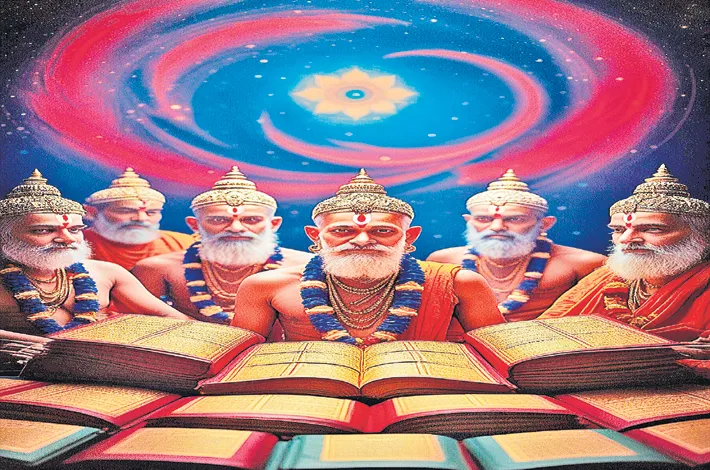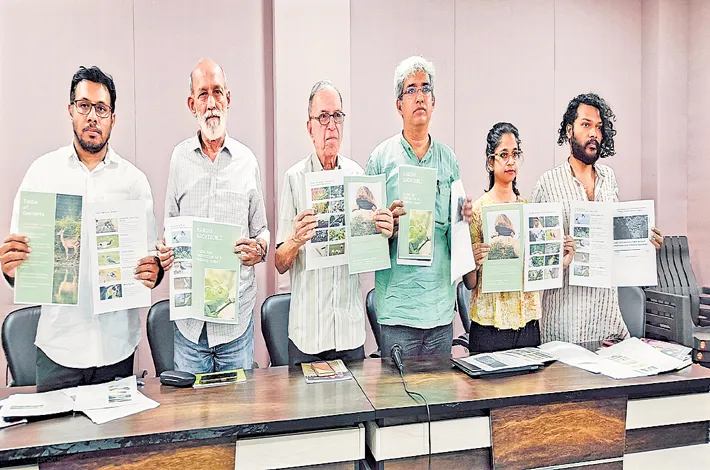The Importance of Faith and Belief in God in the Indian Context
02-04-2025 12:00:00 AM

Faith and belief in God have been integral to Indian culture, shaping its traditions, values, and way of life for millennia. India, often described as a land of spirituality, is a vibrant tapestry of religions, philosophies, and practices that reflect a deep-rooted connection to the divine. From the ancient Vedic hymns to the modern-day rituals in temples, mosques, churches, and gurdwaras, faith permeates every aspect of Indian society. In this context, belief in God is not merely a religious doctrine but a profound force that influences personal identity, social harmony, and moral frameworks.
Historical Foundations of Faith in India
India’s spiritual heritage dates back thousands of years, with the Vedas—some of the oldest sacred texts in the world—laying the groundwork for a belief in cosmic order (Rta) and divine powers. Hinduism, the predominant religion in India, introduced concepts like Dharma (duty), Karma (action and consequence), and Moksha (liberation), all of which are underpinned by faith in a higher power. Over time, other religions such as Buddhism, Jainism, Sikhism, Islam, and Christianity took root, each bringing its own interpretation of divinity and devotion. Despite their differences, these faiths share a common thread: the belief that life has a purpose beyond the material realm.
This historical diversity has fostered a unique Indian ethos of tolerance and pluralism. Faith in God, whether in the form of Vishnu, Allah, Guru Nanak’s Ik Onkar, or Christ, has served as a unifying force, allowing people to find meaning amid the complexities of existence. Even in rural India today, where over 60% of the population resides, faith remains a cornerstone of daily life, guiding agricultural cycles, festivals, and family traditions.
Faith as a Source of Strength
In a country marked by economic disparities, natural challenges, and social upheavals, faith in God provides resilience. For millions of Indians, the divine is a refuge in times of hardship. Take, for instance, the farmer in Maharashtra who prays to Lord Ganesha for a bountiful monsoon or the laborer in Uttar Pradesh who seeks solace at a Sufi shrine after a day of toil. These acts of devotion are not mere superstition; they reflect a deep-seated belief that a higher power can intervene where human efforts fall short.
The COVID-19 pandemic offered a poignant example of this reliance on faith. As hospitals overflowed and families faced unprecedented loss, people across India turned to prayer—whether through online pujas, recitation of the Quran, or lighting candles in churches. Faith became a psychological anchor, helping individuals cope with fear and uncertainty. Studies have shown that spiritual practices, such as meditation and prayer, reduce stress and foster hope, a fact that resonates deeply in the Indian context where religion and mental well-being are closely intertwined.
The Social Fabric and Moral Compass
Belief in God in India extends beyond the personal to the communal. Religion has long played a role in shaping societal norms and ethical values. The Bhagavad Gita’s teachings on selfless action, the Buddhist emphasis on compassion, and the Islamic principle of Zakat (charity) all underscore a moral framework rooted in faith. These ideals encourage individuals to look beyond self-interest and contribute to the collective good.
Festivals like Diwali, Eid, Christmas, and Guru Purab are not just religious celebrations but occasions that reinforce community bonds. They bring people together, transcending caste, class, and creed, and remind them of shared values like generosity, forgiveness, and gratitude. In a nation as diverse as India, where over 1.4 billion people speak hundreds of languages and follow myriad customs, faith acts as a glue that binds society together.
Challenges and Modern Interpretations
Yet, the role of faith in India is not without its challenges. The rise of materialism, urbanization, and globalization has led some to question traditional beliefs. Younger generations, especially in metropolitan cities like Mumbai and Bengaluru, often grapple with reconciling ancient practices with modern lifestyles. Atheism and agnosticism, though still a minority, are gaining visibility, prompting debates about the relevance of God in a scientific age.
Moreover, faith has occasionally been exploited for political or divisive ends, as seen in instances of communal tensions. However, these distortions do not diminish the essence of belief in God for most Indians. Instead, they highlight the need for a balanced approach—one that respects individual freedom while preserving the spiritual core that defines the nation.
Faith in the Future
As India strides into the future, faith and belief in God remain dynamic forces. The proliferation of digital platforms has birthed new expressions of devotion, from live-streamed aartis to virtual satsangs. Meanwhile, interfaith dialogues and movements like the Art of Living demonstrate that spirituality can evolve without losing its essence. For many Indians, faith is not blind adherence but a living, breathing relationship with the divine that adapts to contemporary realities.
In conclusion, the importance of faith and belief in God in the Indian context lies in its ability to offer meaning, resilience, and unity. It is a lens through which Indians view the world—a source of strength in adversity, a guide for ethical living, and a bridge across diverse communities. In a land where the sacred and the mundane coexist, faith is not just a belief; it is a way of life that continues to shape India’s soul.








